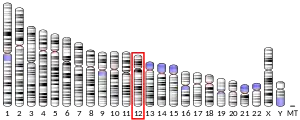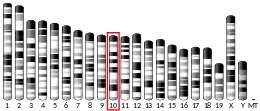BBS10
Bardet–Biedl syndrome 10, also known as BBS10 is a human gene.[5]
| BBS10 | |||||||||||||||||||||||||||||||||||||||||||||||||||
|---|---|---|---|---|---|---|---|---|---|---|---|---|---|---|---|---|---|---|---|---|---|---|---|---|---|---|---|---|---|---|---|---|---|---|---|---|---|---|---|---|---|---|---|---|---|---|---|---|---|---|---|
| Identifiers | |||||||||||||||||||||||||||||||||||||||||||||||||||
| Aliases | BBS10, C12orf58, Bardet-Biedl syndrome 10 | ||||||||||||||||||||||||||||||||||||||||||||||||||
| External IDs | OMIM: 610148 MGI: 1919019 HomoloGene: 49781 GeneCards: BBS10 | ||||||||||||||||||||||||||||||||||||||||||||||||||
| |||||||||||||||||||||||||||||||||||||||||||||||||||
| |||||||||||||||||||||||||||||||||||||||||||||||||||
| |||||||||||||||||||||||||||||||||||||||||||||||||||
| |||||||||||||||||||||||||||||||||||||||||||||||||||
| |||||||||||||||||||||||||||||||||||||||||||||||||||
| Wikidata | |||||||||||||||||||||||||||||||||||||||||||||||||||
| |||||||||||||||||||||||||||||||||||||||||||||||||||
Function
The Bardet-Biedl syndrome 10 protein has distant sequence homology to type II chaperonins. As a molecular chaperone, this protein may affect the folding or stability of other ciliary or basal body proteins. Inhibition of this protein's expression impairs ciliogenesis in preadipocytes.[6][7]
Clinical significance
Mutations in this gene are associated with the Bardet–Biedl syndrome.[5]
References
- GRCh38: Ensembl release 89: ENSG00000179941 - Ensembl, May 2017
- GRCm38: Ensembl release 89: ENSMUSG00000035759 - Ensembl, May 2017
- "Human PubMed Reference:". National Center for Biotechnology Information, U.S. National Library of Medicine.
- "Mouse PubMed Reference:". National Center for Biotechnology Information, U.S. National Library of Medicine.
- Stoetzel C, Laurier V, Davis EE, Muller J, Rix S, Badano JL, Leitch CC, Salem N, Chouery E, Corbani S, Jalk N, Vicaire S, Sarda P, Hamel C, Lacombe D, Holder M, Odent S, Holder S, Brooks AS, Elcioglu NH, Silva ED, Rossillion B, Sigaudy S, de Ravel TJ, Lewis RA, Leheup B, Verloes A, Amati-Bonneau P, Mégarbané A, Poch O, Bonneau D, Beales PL, Mandel JL, Katsanis N, Dollfus H (May 2006). "BBS10 encodes a vertebrate-specific chaperonin-like protein and is a major BBS locus". Nat. Genet. 38 (5): 521–4. doi:10.1038/ng1771. PMID 16582908. S2CID 32269156.
- "Entrez Gene: Bardet-Biedl syndrome 10".
- Maruyama, K; Sugano, S (28 January 1994). "Oligo-capping: a simple method to replace the cap structure of eukaryotic mRNAs with oligoribonucleotides". Gene. 138 (1–2): 171–4. doi:10.1016/0378-1119(94)90802-8. PMID 8125298.
Further reading
- Stoetzel C, Muller J, Laurier V, et al. (2007). "Identification of a novel BBS gene (BBS12) highlights the major role of a vertebrate-specific branch of chaperonin-related proteins in Bardet-Biedl syndrome". Am. J. Hum. Genet. 80 (1): 1–11. doi:10.1086/510256. PMC 1785304. PMID 17160889.
- Gerth C, Zawadzki RJ, Werner JS, Héon E (2008). "Retinal morphology in patients with BBS1 and BBS10 related Bardet-Biedl Syndrome evaluated by Fourier-domain optical coherence tomography". Vision Res. 48 (3): 392–9. doi:10.1016/j.visres.2007.08.024. PMC 2584151. PMID 17980398.
- White DR, Ganesh A, Nishimura D, et al. (2007). "Autozygosity mapping of Bardet-Biedl syndrome to 12q21.2 and confirmation of FLJ23560 as BBS10". Eur. J. Hum. Genet. 15 (2): 173–8. doi:10.1038/sj.ejhg.5201736. PMID 17106446.
- Gerhard DS, Wagner L, Feingold EA, et al. (2004). "The status, quality, and expansion of the NIH full-length cDNA project: the Mammalian Gene Collection (MGC)". Genome Res. 14 (10B): 2121–7. doi:10.1101/gr.2596504. PMC 528928. PMID 15489334.
- Ota T, Suzuki Y, Nishikawa T, et al. (2004). "Complete sequencing and characterization of 21,243 full-length human cDNAs". Nat. Genet. 36 (1): 40–5. doi:10.1038/ng1285. PMID 14702039.
- Dollfus H, Muller J, Stoetzel C, et al. (2006). "[Bardet-Biedl syndrome: a unique family for a major gene (BBS10)]" (PDF). Med Sci (Paris). 22 (11): 901–4. doi:10.1051/medsci/20062211901. PMID 17101080.
- Maruyama K, Sugano S (1994). "Oligo-capping: a simple method to replace the cap structure of eukaryotic mRNAs with oligoribonucleotides". Gene. 138 (1–2): 171–4. doi:10.1016/0378-1119(94)90802-8. PMID 8125298.
- Marion V, Stoetzel C, Schlicht D, et al. (2009). "Transient ciliogenesis involving Bardet-Biedl syndrome proteins is a fundamental characteristic of adipogenic differentiation". Proc. Natl. Acad. Sci. U.S.A. 106 (6): 1820–5. Bibcode:2009PNAS..106.1820M. doi:10.1073/pnas.0812518106. PMC 2635307. PMID 19190184.
- Laurier V, Stoetzel C, Muller J, et al. (2006). "Pitfalls of homozygosity mapping: an extended consanguineous Bardet-Biedl syndrome family with two mutant genes (BBS2, BBS10), three mutations, but no triallelism". Eur. J. Hum. Genet. 14 (11): 1195–203. doi:10.1038/sj.ejhg.5201688. PMID 16823392.
- Strausberg RL, Feingold EA, Grouse LH, et al. (2002). "Generation and initial analysis of more than 15,000 full-length human and mouse cDNA sequences". Proc. Natl. Acad. Sci. U.S.A. 99 (26): 16899–903. Bibcode:2002PNAS...9916899M. doi:10.1073/pnas.242603899. PMC 139241. PMID 12477932.
- Kimura K, Wakamatsu A, Suzuki Y, et al. (2006). "Diversification of transcriptional modulation: large-scale identification and characterization of putative alternative promoters of human genes". Genome Res. 16 (1): 55–65. doi:10.1101/gr.4039406. PMC 1356129. PMID 16344560.
- Suzuki Y, Yoshitomo-Nakagawa K, Maruyama K, et al. (1997). "Construction and characterization of a full length-enriched and a 5'-end-enriched cDNA library". Gene. 200 (1–2): 149–56. doi:10.1016/S0378-1119(97)00411-3. PMID 9373149.
External links
- GeneReviews/NIH/NCBI/UW entry on Bardet-Biedl Syndrome
- Bbs10 protein, human at the U.S. National Library of Medicine Medical Subject Headings (MeSH)
- Human BBS10 genome location and BBS10 gene details page in the UCSC Genome Browser.
This article is issued from Wikipedia. The text is licensed under Creative Commons - Attribution - Sharealike. Additional terms may apply for the media files.



